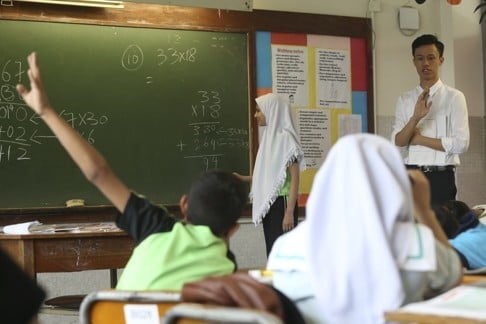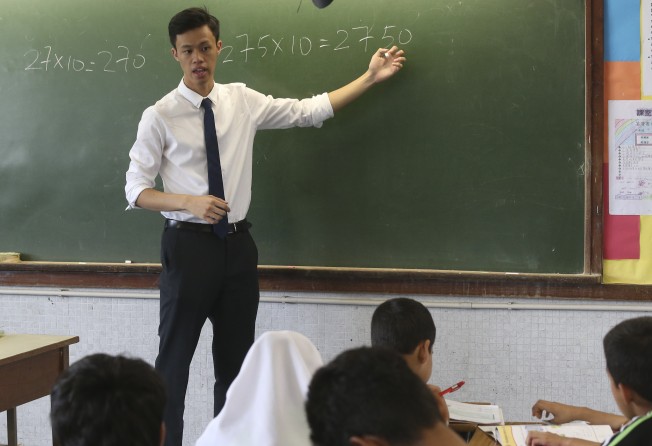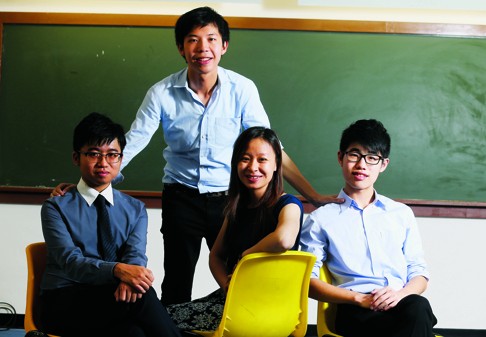
Volunteer teachers help poor Hong Kong pupils see the bigger picture
Teach4HK’s volunteers give life and careers lessons to underprivileged children and run extracurricular activities for them. Elaine Yau meets the charity’s founders and some of its teachers

Mixing some baking soda into a vinegar-filled jar, Theron Mok Man-to creates a column of foaming bubbles. It all seems like magic to his rapt students at Tsuen Wan Trade Association Primary School.
Although he teaches at the Tsing Yi school, Mok isn’t on its roster of official teaching staff.
He is among six new recruits charity Teach4HK has sent to resource-starved schools to help lift the achievement of students from poorer families.
Whereas regular teachers at the school are bogged down by heavy workloads, handling paper work in addition to preparing for lessons, Mok is freer to experiment with his presentations and get to know the children in his class.
“I only teach two classes here, so I have more time to nurture personal relationship with students, giving them life and career education,” he says.

Teach4HK was founded by former asset management executives Arnold Chan Kwan-yeung and Cheney Cheng Ki-sum. They modelled the organisation on US charity Teach for America that enlists top new graduates from around the country to teach in underprivileged schools.
The pair first met as secondary students when they volunteered for the Children’s Council, an NGO promoting children’s rights, and became interested in working with underprivileged groups.
Many grass-roots children attending government schools don’t have access to the resources available to students from middle-class families, Chan says.
“There are about 50 schools which have never had one student advance to university. These students may have many talents but the local education system is unable to nurture them and considers them to be failures.”

Their research shows that more than 40 per cent of students from grass-roots families lack exposure that others enjoys: they can’t afford to join extracurricular activities, and some have never even been out of their districts to others like Tsim Sha Tsui.
They have little idea about what to do for a career and usually end up working in sales or other low-skill jobs, Chan says.
Instead of focusing solely on boosting youngsters’ academic performance, the Teach4HK volunteers try to expose them to other options through life and career education programmes and organising extracurricular activities that are not offered in schools.
For instance, one of the recruits is a former journalist so she runs a junior reporter programme at her secondary school.
Another volunteer with a design background organises design workshops and watch design competitions for students, in collaboration with designers from watchmaker Fossil, which is a sponsor. Other sponsors help set up golf, rugby and sports clubs in schools, Chan adds.
Now pursuing an MBA at Harvard, he regularly returns to Hong Kong to help manage the charity. His contacts in the business sector have been a big help to his fledgling charity, he says.
“Some donors were introduced to us by members from the Harvard Club. I have a passion for teaching, but I like building a company as an entrepreneur more. Setting up Teach4HK allows me to combine both.”
Teach4HK has so far raised more than HK$2.3 million from the government and private sector, not bad for a charity set up only two years ago by a couple of young men in their 20s.
I have a passion for teaching, but I like building a company as an entrepreneur more. Setting up Teach4HK allows me to combine both.
Of the pair, Cheng works full-time at Teach4HK and Chan will do the same after completing his MBA in April; neither draws a salary. They launched the placement programme last September and with the six volunteer teachers, the group now has 10 full-time staff.
Selected from more than 100 candidates, the recruits are assigned to schools for a year, during which time they are paid monthly stipends of HK$10,000.
“They are passionate about education and have the leadership qualities to help underprivileged students. But it is the school principals who make the final decision on employment of the candidate as they are the ones who actually have to work with the teachers.”
Before being despatched to schools, the six graduates underwent two months’ training at Chinese University’s education faculty.
Movers and shakers in the education sector also offered support: Former undersecretary for education Kenneth Chen Wei-on shared his perspectives on learning, solicitor and social entrepreneur Ada Wong Ying-kay taught recruits about boosting creativity education in schools; HKU education professor Cheng Kai-ming advised them on programme design; and other academics taught them about the use of e-learning and flipped classrooms.
Their first year would serve as a trial run, Chan says, and they plan to expand the placement scheme to other primary and secondary schools serving underprivileged kids (by their definition, that means at least half the student population would be on government assistance).
The team at Teach4HK meets fortnightly to review their teaching experience and suggest possible strategies for improvement.
At the Tsing Yi school Mok has been exploring ways to engage his unruly students, who are mostly non-Chinese speakers.
“They are happy kids. But they see going to school as a chance to have fun, not to study,” he says.
So to cultivate their sense of responsibility and empathy, Mok has been organising after-school sessions every day, when he trains the youngsters to be little teachers who would take turns conducting lessons in the classroom.
“After they started teaching fellow students, they begin to understand the teacher’s difficulties and behave better in class.”
He also encourages the children to explore different fields and think about what they want to do in the future.
“For such students, they need to see the actual thing with their own eyes before they develop a goal for themselves,” Mok adds.
His fellow Teach4HK recruit, Francis Lau Hiu-long, has found other ways to involve his students.
Lam eats lunch with his students in the classroom several times a week, and he says the time for conversation allows him to learn about their family situation and why they lack motivation to study. “Some students pay more attention in class and stop running around the classroom after I develop a relationship with them,” he says.